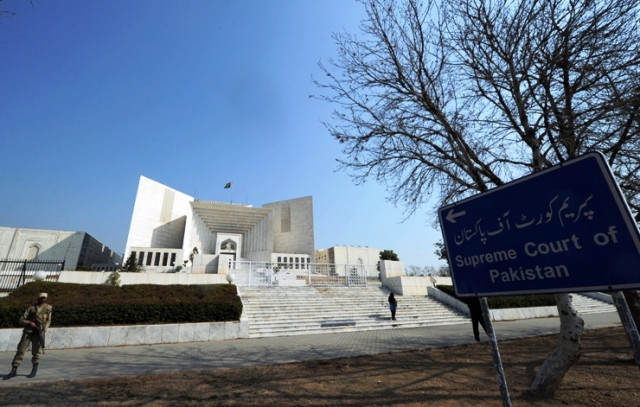Agro-farms case: SC reprimands CDA officials for legalising illegalities
Counsel admits lacunas in notification.

"If agro-farm owners can be exempted, why are residents of katchi abadis denied the right to shelter," asks Justice Jawwad S Khawaja. PHOTO: AFP
The Supreme Court judges on Monday reprimanded city managers for legalising violations of rules by owners of agriculture farms and warned them of consequences for their illegal move.
The apex court also identified serious lacunas in a notification of the Capital Development Authority (CDA) regarding regulations of over 500 agriculture farms.
A three-judge bench of the apex court headed by Chief Justice Iftikhar Muhammad Chaudhry warned the CDA officials of consequences for this move.
The authority’s counsel Afnan Kundi informed the court that the notification had been approved on April 23, 2013 by the CDA board with retrospective effective from 2004.

“How could CDA extend relief through a simple notification?” the judges asked.
The wording of the notification legalising all violations in terms of constructions beyond permissible limits in the garb of a Supreme Court order was a matter of concern for the judges.
The court reprimanded the CDA chairman, who was not present in the courtroom, stating that if he could not run the affairs of the authority then it would be better for him to quit. “We will not allow anyone to use the name of this sacred institution to settle scores,” the CJ said. He questioned the officials, “Why are you people are so handicapped? Let the law take its course.”
The CDA counsel agreed to omit SC’s mention from the notification.
However, Justice Jawwad S Khawaja, a member of the bench, asked the CDA how it could issue a notification retrospectively to give benefit to few hundred individuals.
“If we allow this practice to continue it will become a precedent and tomorrow we will have a big colony at Margalla Hills and you the government and CDA would legalise it,” the judge remarked.
Giving his opinion on the new notification, Attorney General Munir A Malik said that a fresh law is required since amnesty cannot be extended without proper legislation and sought two weeks to brief the court on this issue. The list submitted by the CDA revealed that only two out of 502 agro-farm owners are adhering to the terms and conditions.
The court asked the counsel to reveal names of the two owners so people could also know about them, particularly when CDA itself was not enforcing its rules.
The CDA is responsible for all such practices because it is avoiding an impartial implementation of rules, the bench added. “If agro-farms owners can be exempted, why are residents of katchi abadis denied the right to shelter,” asked Justice Khawaja.
The AG agreed with the court’s concern and said that there is a need for a fair scheme in this regard. He sought a last chance from the court to convince CDA. He also complained that he wrote thrice to CDA in this regard but the ‘able officials’ did not bother to reply.
“It is easy to commit violations first and then amend the law to rectify them,” the chief justice observed. “Tell us the names of persons who are above the law.”
Kundi said that due to the court’s restraining order, CDA did not initiate action. The court, however, rejected this stance, saying that they never stopped CDA from ensuring the implementation of its rules.
The CDA’s counsel said that the government officials were not fluent in the English language and he would look into this matter.
Salman Akram Raja, council for agro-farm owners, informed the court that all relevant laws were being observed and no violation had been committed from the day one. The court will take up this case in mid-October.
Published in The Express Tribune, October 1st, 2013.



















COMMENTS
Comments are moderated and generally will be posted if they are on-topic and not abusive.
For more information, please see our Comments FAQ